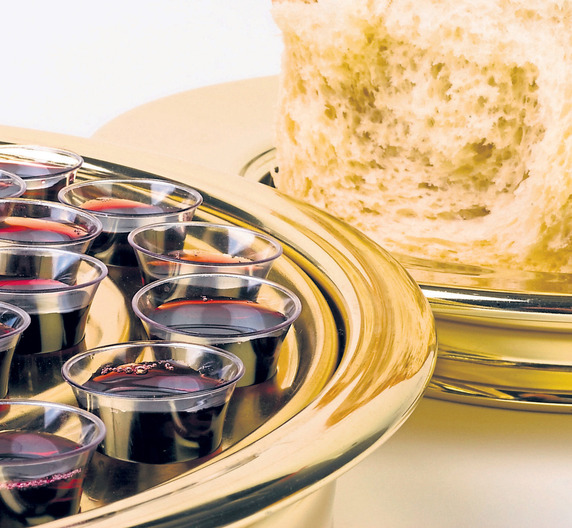Is your church glued together?
In October a new book was released encouraging us to think biblically about the organisation and leading of our churches
Matthew Benton

What is the significance of participation in the Lord’s Supper?
It is has long been suggested that the health of family life is strengthened by eating together. It is not, of course, that simply eating together makes you family – that happens by other means – but the family meal table is glue for family life.
Imagine a household in which blood-related people lived, and yet they never ate together. Could you call that collection of people a family?
It is not simply that all human beings have to eat and drink. While growing up, my brothers and I may have resembled sus scrofa domesticus (pigs) at a trough sometimes. Yet something else happened round that family table over the months and years. Laughter and tears, songs and stories, memories created, relationships deepened, the family strengthened. Meals greatly enhance community.
God’s family
Just as eating together is important for the health of family life, so with God and his people. The Lord’s Supper is not to be understood in purely personal terms, as some type of sacramental grace from God to the individual. Rather, in the language of Oliver O’Donovan, it is about the ‘formation of the body’.
From the outside looking in, it is the ongoing means by which the church is defined and made visible – in a particular place, in a particular moment in time. Inside the church, through participation in this meal, God’s people are reminded of the means, but also the reality, of their being God’s people. It is a meal through which God’s people are marked out and bound together and as such should be at the centre of church life.
More than remembrance
As we look on at the celebration of the Lord’s Supper, we view a communal meal instituted by Jesus that defines a people as those bought by Christ, belonging to him. It is the means by which the church is defined and made visible.
So what is it like to be on the inside, as an individual participating in this meal? The most common answer would be to talk simply in terms of remembrance. Jesus commanded his disciples to ‘do this in remembrance of me’ (1 Corinthians 11.24,25). But it seems that the Bible sees the Supper as more than just an aide-memoire.
To partake is also to acknowledge the authority of this King. The contours of the Old Testament help us understand this. The gift of food from the King also acknowledges that one is subject to that King. Whom you are willing to sup with seems to have great implications in the Bible; it is not a casual thing, but a covenant-ratifying act.
The opening chapter of Daniel recounts how Daniel and his friends, having been brought into the royal court of Babylon, are ‘assigned’ a daily portion of the food and wine that the king ate and drank. Daniel and his friends see partaking of the royal food and wine as an act of defilement (Daniel 1.8). Many argue that what was on the menu would have caused the defilement. However, the passage itself speaks more about whose food it was, rather than what food it was. Daniel and his friends have been exiled, made subjects of a new king, but Daniel underlines by refusing the gift of the king’s food that Nebuchadnezzar is not ultimately his king. For Daniel and his friends, as the rest of the book underlines, they serve the eternal King who provides for their every need.
Eating in Eden
Contrast that dietary decision with that of the first man and woman in the garden. Told by God that they may eat of any of the trees of the garden apart from the tree of the knowledge of good and evil, they make their own menu choice. That infamous meal takes place not under the authority of God, but under the serpent’s deception. It is a meal of rebellious defiance that breaks fellowship with God, declaring independence from the rule of God the creator. In a similar fashion, in Exodus 32, another meal is recorded as Aaron and the people worship the golden calf. It is an act that identifies them and unites them in their idolatry (Exodus 32.6). There is then, a sense that whose table you eat at announces who you are and to whom you belong.
Marking off and binding
In 1 Corinthians 10, Paul references that episode in Exodus 32 as he speaks of the dangers of idolatry. It may seem to some that he makes a huge leap in his argument, as by 10.16 he brings us to the Lord’s Table. Yet if, as we have seen, under whose jurisdiction we eat matters because it reflects loyalty and willing submission, then to eat at the table of the Lord must communicate that we willingly submit to the rule of Christ.
Paul puts it bluntly in 10.21: ‘You cannot drink the cup of the Lord and the cup of demons too; you cannot have a part in both the Lord’s Table and the table of demons.’ The apostle is making a crucial point about a person’s participation in the Lord’s Table.
Again the table that we eat at defines us as one people. ‘Is not the cup of thanksgiving for which we give thanks a participation in the blood of Christ? Because there is one loaf, we, who are many, are one body, for we all share the one loaf’ (1 Corinthians 10.16-17). To participate is to share with others in the blood of Christ. To eat of the one loaf is to announce that we are united as one body.
Receiving and renewing
Participating in the Lord’s Supper declares us to be God’s people living under his rule. This hugely raises the bar of our understanding of the Lord’s Supper because we are each declaring to which side we belong.
To partake is to receive Christ’s benefits. To take of the bread and the cup is then to feed spiritually upon Christ. As Calvin puts it, the Lord’s Supper is the means by which Christ ‘transfuses his life into us’.
Partaking in the Supper is to be given a present seal of God’s promises to us in Christ, thereby strengthening our faith in his work. The Lord’s Supper leads me to rediscover again that my worth and righteousness are found in Jesus’ blood and righteousness alone. I am forgiven, united with Christ, and made a member of God’s household, the church. The Lord’s Supper works alongside the gospel word not only to remind but also to make the gospel a felt reality, as through our taking of the physical elements the Spirit makes known his presence with us.
Joined to Christ and each other
Such fellowship with Christ by means of the Lord’s Supper tangibly reaffirms that I am not only joined to Christ but also I am joined to those with whom I eat. As we share together in the blood and body of Christ we are reminded that, for each of us, our worth and righteousness is in our Saviour. We all share of the same loaf and so ‘we who are many are one body’ (1 Corinthians 10.17).
In 1 Corinthians 11, as Paul gives instructions in regard to the Lord’s Supper, he emphasises the togetherness it expresses. He reiterates the same word ‘together’ (synercho- mai) five times, in verses 17, 18, 20, 33 and 34. This togetherness reminds us that being united to Christ means that we are united to one another. We are one body and so the Lord’s Supper is the reminder that we are family. The Supper is the glue for the life of the local church.
Matthew Benton is pastor of Limes Avenue Baptist Church, Aylesbury
This article is an extract from Pure Church, from Grace Publications, written by a symposium of pastors. Available from Christian Books Dunstable, 10ofThose.com and ICM.


